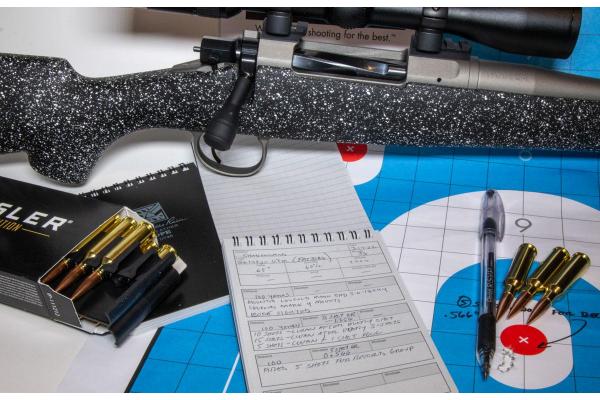There are several good reasons to track each shot you take with your rifle
Sometime back I was introduced to Berit Aagaard, the widow of Finn Aagaard who was a professional hunter in Africa and then a gun writer after he moved to America.
In fact, many of his readers and a of industry professionals considered Finn one of the finest gun writers to ever bang on a typewriter.
Berit and I became friends and while visiting her home in Llano, Texas, she allowed me to examine many of Finn’s papers.
What I found somewhat remarkable was that Finn kept a logbook for every rifle he owned and tested.
Generally, rifle logbooks are thought to only be applicable to snipers and competitive shooters who compete at extreme distances.
Admittedly, for both applications a logbook is mandatory if success is of any importance to the shooter.
However, Finn’s approach is not a bad idea either.
Though not as comprehensive as Finn’s, I began to keep records for the guns I tested. It has proved educational but more importantly for a gun writer, a great resource.
But I also started keeping detailed records for all my rifles. Over time it has proved extremely helpful is several ways.
Ammunition Performance
Maybe the best reason for the average shooter/hunter keeping a logbook for a rifle is to track ammunition performance.
It can give you a record of the loads that deliver the best precision. It can keep track of trajectory at various distances and the specifics of how the loads were zeroed.
Additionally, it is a great place to store chronograph data.
If you handload your ammunition a logbook seems mandatory, especially if you have any plans on recreating certain loads that perform well.
Maintenance
One thing that I religiously keep in the logbooks for my rifles is a record of maintenance.
This allows me to reference when I cleaned the bore and to what extent I cleaned it.
This information, combined with the ammunition performance, allows to me see if and how much cleaning the barrel impacts precision. I also note the type of bore solvent used and how effective it seemed to be.
Additionally, I make notes when I change the scope on the rifle or add accessories, and I record appropriate torque settings for action and scope mount screws.
Field Notes
Humans are flawed creatures; our capability to remember things is not what we think it is.
I can remember the ammo I used for most of the big game animals I’ve taken, but my recollection of the specifics of the bullet’s performance is not so good.
A rifle logbook allows me to record these observations for later reference.
Just as with a military sniper it also provides a place to make notes about shots taken at distance and the correct shooting solution as it relates to the range to the target and environmental conditions.
Shot Log
Somewhat similar to a maintenance record is a shot log. A rifle’s shot log is like the odometer in a car or the hour meter on a tractor.
It tells you exactly how many rounds you fired on a particular day as well as how many total rounds have been fired through the rifle.
If you want to clean your rifle’s barrel after every 100 shots, this is how you keep track of that. You may find that accuracy degrades after a certain number of shots.
I used to have a .257 Roberts and its groups would triple in size after about 25 shots.
After punching the tube, it went right back to shooting half-inch groups. By keeping the shot log, I knew when that rifle’s barrel needed cleaned.
Value
A rifle logbook can add value to your rifle if you decide to sale or trade.
A friend who runs an auto dealership told me the first thing looked at when a vehicle brakes down after the warranty has expired is the service record.
If the dealership has performed all the necessary service on time, it’s possible the repair will be covered.
If not, you’re writing a check. Detailed maintenance records also add value to a vehicle when traded.
Similarly, if you’re wanting to sale or trade a rifle and can show the prospective buyer a record book indicating ammunition performance, maintenance, field notes, and every shot that has been fired through it, your rifle is worth more.
The logbook is essentially a biography of that rifle.
Logbook Options
Unless you’re a sniper or long-range competitor, most commercial logbooks are not suited for the average shooter or hunter.
A simple compact spiral notebook you can throw in the case with the rifle will suffice. A three-ring binder will work too.
For years I’ve used both methods. You can also keep a digital log on your computer. But recently I found the Dope notebook offered by Rite in the Rain.
It has sections for general information, a shot log chart, and dated data sheets that will contain all the pertinent information most shooters need to keep.
